- Home
- Harlan Ellison
Angry Candy
Angry Candy Read online
INTRODUCTION BY PATTON OSWALT
DOVER PUBLICATIONS. INC.
MINEOLA, NEW YORK
Copyright
Introduction Copyright © 2016 by Patton Oswalt.
Copyright © 1988 by The Kilimanjaro Corporation. A Houghton Mifflin Book, by arrangement with the Author. All rights reserved. No part of this book may be reproduced in any form or by any electronic or mechanical means, including information storage and retrieval systems, without explicit permission in writing from the Author or the Author's agent, except by a reviewer who may quote brief passages in a review to be printed in a magazine or newspaper, or electronically transmitted on radio or television. For information, address Author's agent: Richard Curtis Associates, Inc.; 200 East 72nd Street, Suite 28J, New York. New York 10021.
Cover Design Copyright © 2016 by William Stout.
The stories in this collection originally appeared in the following anthologies and magazines: THE BLACK LIZARD ANTHOLOGY OF CRIME FICTION and UNIVERSE 15: The Best of Omni #6, Galaxy Magazine, Gallery, The Magazine of Fantasy and Science Fiction, Midnight Graffiti, The Mystery Scene Reader, Omni, The Twilight Zone Magazine, Shayol, and Weird Tales. "Broken Glass" was originally published as a broadside by The Avenue Victor Hugo Bookstore, Boston.
The stories are variously copyright © 1980, 1981, 1982, 1983, 1984, 1985, 1986, 1987, and 1988 by The Kilimanjaro Corporation.
"The Region Between" copyright © 1969 by Universal Publishing & Distributing Corporation; design and graphics for this story by Jack Gaughan copyright © 1969 by Universal Publishing & Distributing Corporation; copyright in story, design and graphics reassigned to Author, 7 July 1980; copyright© 1980 by The Kilimanjaro Corporation.
All persons, places, and organizations in this book—except those clearly in the public domain or used with permission—are fictitious; and any resemblance to actual persons, places, or organizations living, dead, or defunct, is purely coincidental. These are works of fiction.
Bibliographical Note
This Dover edition, first published in 2016, is an unabridged republication of the work originally published by Houghton Mifflin Company, Boston, in 1988. A new Introduction written by Patton Oswalt has been specially prepared for this edition.
Library of Congress Cataloging-in-Publication Data
Names: Ellison, Harlan, author.
Title: Angry candy / Harlan Ellison ; introduction by Patton Oswalt.
Description: Dover edition. | Mineola, NY : Dover Publications, 2016.
Identifiers: LCCN 2015044140| ISBN 9780486800387 (softcover) | ISBN 0486800385 (softcover)
Subjects: | BISAC: FICTION / Short Stories (single author). | FICTION / Science Fiction /
Short Stories. | FICTION / Fantasy / Short Stories. | GSAFD: Fantasy fiction. Classification: LCC PS3555.L62 A6 2016 | DDC 813/.54—dc23 LC record available at http://lccn.loc.gov/2015044140
Manufactured in the United States by RR Donnelley
80038501 2016
www.doverpublications.com
And this little box of bon-bons is for the only other man I know who enjoys poisoned chocolates . . .
my friend
ROBERT BLOCH
ACKNOWLEDGMENTS
They've been at it again. The ones who encourage me in these efforts. The ones you can blame for making it easier to write the words. It's their fault: I'm merely a victim of the fever, or as Heinrich Von Kleist put it, "I write only because I cannot stop." So you see, it's all depositable at the feet of:
Dottie Amblin, Georgie Auld, Sophie & Stan Barets, Michael Bernstein, Franco & Carol Betti, Bob Booth, Alan Brennert, Sharon Buck, Jody Clark, Sarah Coatts, James Crocker, Richard Curtis, Ellen Dat-low, Phil DeGuere, Judy-Lynn del Rey, Lance A. Diernback, Bart Di Grazia, Gardner Dozois, Diane Duane, Susan Ellison (wife-person), James Ellroy, Jack Gaughan, David Gerrold, Ed Gorman, the Grand Forks (North Dakota) Public Library, Ellie Grossman, Mike Hodel, Ejler Jakobsson, Tom Kafka, Alan Kay, Ann Knight, Grant Kornberg, Gil Lamont, Michele D. Malamud, Vincent McCaffrey, Patrice Messina, Don Myrus, Larry Niven, Rockne O'Bannon, Austin Olney, Otto Penzler, Frederik Pohl, Barry J. Post, Eric Protter, Robert J. Randisi, Kathleen Roché-Zujko, Charles C. Ryan, Robert Silverberg, Dr. C. D. Spangler, Jr., Michael Toman, Glynn Turman, Mark Valenti, Bill Warren, and Sheila Williams.
They're all in this with me. If I gotta swing for it, I'll take 'em all with me.
Incidentally, just to quash the rumors, neither Ronald Reagan and Ed Meese, nor Jerry Falwell, turned a hand to help me.
CONTENTS
Introduction by Patton Oswalt
Introduction
Paladin of the Lost Hour
Footsteps
Escapegoat
When Auld's Acquaintance Is Forgot
Broken Glass
On the Slab
Prince Myshkin, and Hold the Relish
The Region Between
Laugh Track
Eidolons
Soft Monkey
Stuffing
With Virgil Oddum at the East Pole
Quicktime
The Avenger of Death
Chained to the Fast Lane in the Red Queen's Race
The Function of Dream Sleep
INTRODUCTION: ARRIVING AT ELLISON
What the hell is a "Wunderlich print"? Or a "Soleri notebook"?
I was reading Harlan Ellison's Approaching Oblivion in 8th-grade detention, from 3:20 pm to 4:20 pm, after school at Seneca Ridge Middle School in Sterling, Virginia. It was 1982. And those were the two burning thoughts in my head, as I read the introduction to my Science Fiction Book Club edition of Ellison's short story collection.
I was a soft suburban cage-raised veal that wished he was a flinty urban street-legal cheetah. There were no good drugs in my town. Or readily available fringe experiences, or even buses to take us into Washington, DC. And I'm sure, if there had been? I'd be too timid to take them.
So the stories of Harlan Ellison were my first bolt-hole into the outre. I read "A Boy and His Dog" in the anthology, They Came From Outer Space, edited by Jim Wynorski. It was the last story in the book. There, after stately and respectful tales like Arthur C. Clarke's "The Sentinel" and John W. Campbell's "Who Goes There?" was Harlan's punk-y, sneering novella. Like a Buzzcocks song at the end of a Dan Fogelberg album. I was hooked.
I checked Ellison Wonderland out of my school's library and, later, stole it. Years later, after I'd grown up and moved away and started a career in Los Angeles, I returned to visit my parents. I brought the little hardbound, paperback-sized copy with me and quietly returned it. I think that's one of the steps of Alcoholics Anonymous.
But I wasn't anonymous about my Ellison-holism, and would preach the gospel whenever I got the chance. It helped (or didn't help) that Ace paperbacks were reissuing all of Harlan's earlier collections. No Doors, No Windows, and Web of the City and Partners in Wonder and Paingod and Gentlemen Junkie. And then, through the Science Fiction Book Club, came my hardback, purple-hued Approaching Oblivion. A little picture of Harlan sitting in a very Mad Men-esqae easy chair, looking up from a Leo and Diane Dillon maelstrom of faces and fury, both inviting the reader and mocking the reader in the same look.
Approaching Oblivion has an introduction by Michael Crichton called "Approaching Ellison," wherein Crichton describes visiting Harlan in the latter's home high in the Sherman Oaks Hills. And he describes the interior of Harlan's home—and then Harlan himself—thusly:
"Inside, the feeling is sensual, almost sybaritic, with a quality of tension that comes from a barely controlled chaos. There are books everywhere, thousands of books, lining walls, tucked above doorways, filling closets, threatening to spill out and consume the living space. There are bizarre juxtapositions at every turn: signed Wun
derlich prints, Soleri notebooks, sculpture from Mozambique, psychedelic book art set side by side in confusing protrusion. It takes enormous energy to hold all this together, and Ellison himself appears to have boundless energy. He moves restlessly, talking nonstop, jumping from books to television to politics to sex to movies, taking up each next subject with considerable humor and aggressive enthusiasm."
I could not have been more envious. To visit Harlan Ellison in the man's home, to see all of that confusion, all of those outgrown tendrils of his own inner psyche surrounding you, to see them all wired back into the man himself? Crichton—and everyone else who'd visited that house—had been granted a ticket to Wonka's Factory. I envied Mick Jagger more for his time spent at Harlan's house than I had him writing "Gimme Shelter."
Okay, let's wrap this up. Let's jump ahead. There are stories you should be reading. Harlan Ellison stories. If you listen, you can hear them pressing up against the flimsy walls of this introduction, like a horde of meth-tweaked cannibals. They're coming, so I'll be quick.
Twenty-six years later I got to meet Harlan. Got to go visit him at his house. Saw the Wunderlich prints and Soleri notebooks and sculpture from Mozambique. Climbed the stairs to his office, saw the same battered Olympia portable typewriter that's on the author photo on the back of Approaching Oblivion. And that initial visit, where we ate Ritz crackers and drank black coffee and talked about the heart attacks that can't seem to kill him and the mediocre times we're trapped in that just might kill him—turned into a second visit. And then another. And another.
And now, once a week, I get to pilot my car up the crags and byways of the Sherman Oaks hills, to an unassuming little house with the sign that says "Dig, Or Split" near the door. I've seen the pen that drew the Silver Surfer and the door to Ellison Wonderland and his Hugos and Nebulas and the toy soldiers and the Dr. Strange window and the endless books and art and records and collectible coins and . . . my head's gone blurry.
Because in the center of all that, of that visual hurricane, is the eye of the storm which, in itself, is another, stronger storm. Harlan Ellison. His stories led me to some pretty amazing places in my imagination, in my further reading, and my career. I never could have imagined they would have led me to him.
Thank you, Harlan.
PATTON OSWALT
INTRODUCTION: THE WIND TOOK YOUR ANSWER AWAY
WE WENT TO THE funeral on a pleasantly cool but very sunny Sunday afternoon in February. I'm not sure I'd ever been to Redondo Beach before that Sunday, though I've lived in Southern California since 1962, and we had some small difficulty finding the Church of Religious Science. We: my wife, Susan, my old friend Norman Spinrad, who had been Emily's lover, and I, who had been her friend. I parked the car a few blocks away, and we got out and, without talk, we went back up the street to the friendly-looking, modern church where Emily's spirit was to be honored.
Saturday a week, Emily had been at home, changing clothes to meet her daughter for dinner. I'd talked to her that morning. I couldn't remember what we'd discussed, perhaps something about the business of copyediting and proofreading that she shared with Gil Lamont. She was planning to come by to see Susan and me early the next week.
I never knew she had epilepsy. She never mentioned it. If I had known, maybe I might have . . .
No, that isn't anything. You think it; but it isn't anything.
She was all dressed up, looking as she always looked, like a million bucks tax-free, and she must have been checking herself out in the mirror one last moment before leaving, because they found her lying beside her bed, composed and well-dressed, dead from a stroke or cardiac arrest or a thrombosis — I can never figure out how they differ, I'm sorry — and I always feel the trembling start when I try to make a picture in my head that will tell me if she was lying looking up or face down. There is no reason in the world why I should need to know that, but I still feel as helpless and lost as I did then, when I think of Emily dying all alone like that, and I keep thinking if I knew whether she was prostrate or supine it would help stop the loneliness. But that isn't anything, either. I know that.
She had had a seizure, and her heart had stopped, and she had gone away without anyone knowing, or even hearing a sound.
They found Emily the following Monday.
And now it was Sunday a week, and we were going to the funeral. We didn't know anyone there. Emily's life was very compartmented, and she had wide circles of friendship in half a dozen social settings. Both Norman and I had been asked to speak about her, because we had known her during this last part of her life, when she was getting things together again and having a fine old time, and feeling more alive than she had in years, but we felt like outsiders, like intruders coming in for the big show who weren't bearing the proper credentials.
We sat through the early part of the service, and we perhaps heard the remarks and sentiments from the minister, Mr. Richelieu. Then he called on me, and everything I'd wanted to say about Emily, about her warmth and decency and flawless friendship and personal strength, all of it fled, and I was angry. There is no other word, I was just god-damed angry!
Richelieu had done that standard number about the deceased going on to a better place, that Emily was at peace at last, that we could all take heart in the sure and certain knowledge that she was watching us from on high, and smiling at us.
April 1985
Larry Shaw Tom Sherred
May 1985
Ted Sturgeon
July 1985
Jack Gaughan
October 1985
Bernard Wolfe
December 1985
Walter Gibson Howard Rodman
January 1986
L Ron Hubbard Emily Austin
February 1986
Bob Mills Frank Herbert Judy-Lynn del Rey DeeDee Lavender
April 1986
Manly Wellman Terry Kirgo Tom Scortia
May 1986
Mike Hodel
June 1986
Benny Goodman Jorge Luis Borges
July 1986
Stan Ellin
September 1986
Jerry Jacks
November 1986
Glenn Wright
And I began speaking, and I'm not sure exactly what I said, but it was like this:
It's not seemly to speak harshly at the funeral of someone you loved, and who's gone away, and you miss so much it squeezes your chest when you think about them. It's not right to make a big scene and cry about how it hurts when you ask that lost friend a question, and she's not there to answer, as if the wind took her answer away, and if you listen hard enough you can still hear her voice receding, getting thinner and smaller and more transparent. We're not supposed to do that. We're supposed to reassure one another, and say dumb things like, "Well, she couldn't have suffered much." And I want to say things like that, because ceremonies like this are for the living, and not the dead, because the dead are gone and can't hear what we say, and I can't even take any solace in that, because it isn't a new thought. And the truth of it is, I can't take any solace at all, because Emily is dead. She's just gone, and we won't hear her cleverness ever again, and we won't see the way she gave that wry smile, as she turned half-away so you could enjoy what she'd said without having to worry about her reaction. No one allows us to be angry. It isn't fitting, it isn't seemly. But that's how I feel. I'm just pure and deeply angry that she's gone. That she died when her life was so good. That's cruel. It's like some kind of old Arabian Nights revenge, where the djinn waits till you're happiest to slice you down. And in the compassion that we try to show each other, we won't let ourselves be angry, won't let ourselves scream at the world that is now minus that special part.
You can be angry! "Do not go gentle into that good night, old age should burn and rave at close of day; rage, rage against the dying of the light." It will be a brief enough time before our daily measure softens the edges of memory, and Emily, and all that she was, and all the places in which she resided in our
hearts will have closed over like the Red Sea, and we won't feel like being angry. We'll just be miserable, and lonely for her, and we'll never have taken the opportunity to let the stupid nasty world that took her know how much we miss her and how just goddamed angry we are!
December 1986
John D. MacDonald
January 1987
Dick Sapir
February 1987
Ted Cogswell Jimmy Coco
March 1987
Dick Levinson Arch Oboler Bea Mahaffey Dick Wilson
April 1987
Catherine Moore Ejler Jakobsson Terry Carr Dick Shawn
May 1987
Joey Lo Brutto Ali Sheldon Frank Andrasovsky
June 1987
Fred Astaire Matt Morrell
August 1987
John Huston Lee Marvin
September 1987
Alfy Bester
October 1987
Richard Delap
November 1987
Ron Smith
And I sat down, and could feel that these people were angry, but not at Emily's death. They were angry because I hadn't played the game. And I felt awful, just awful, and I hung my head. And Susan touched my hand, and I cried.
And Norman got up, and he climbed the risers to the platform filled with flowers, and he stood behind the lectern, and he spoke so well. He believed as I believed, that it is better to send off the loved one with rage, to show at least for a moment to the empty sky and the sunny day that you cared, enough to look cranky and unseemly, that the loved one deserved at least that much, but he was saner that I. He said (and this is just a part, just the best part that I remember), "Don't expect justice. Emily being taken like this, is not fair. It is not just. She never deserved to die so soon. There is no justice inherent in the universe . . . except what we put there. All the justice that exists, is what we make. So let us show compassion and sense and courage, in Emily's name."
Oh, that was so much better. I wish I'd had the wit or the skill or the clear head to say that. Because it was what lay at the core of my anger. It was something that could keep you busy while mourning. It could kill the guilt at not having been there to save her. Of not having said to her the things you now realized she needed to hear from a friend. Of not feeling adequate to face death. It was wise and sane and correct.

 Repent, Harlequin! Said the Ticktockman
Repent, Harlequin! Said the Ticktockman Broken Glass
Broken Glass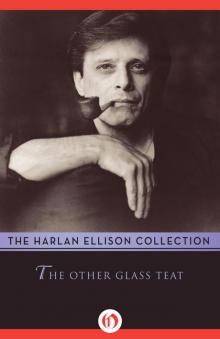 Other Glass Teat
Other Glass Teat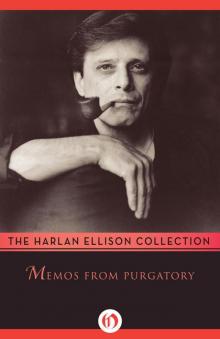 Memos From Purgatory
Memos From Purgatory I Have No Mouth and I Must Scream
I Have No Mouth and I Must Scream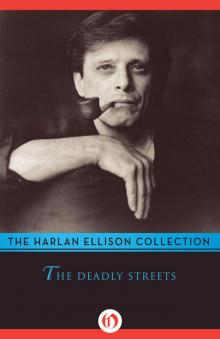 The Deadly Streets
The Deadly Streets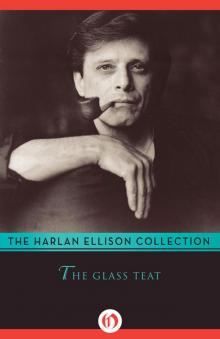 The Glass Teat
The Glass Teat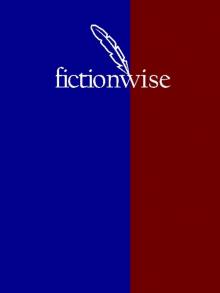 Paingod and Other Delusions
Paingod and Other Delusions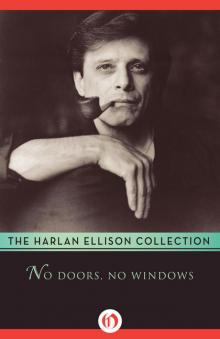 No Doors No Windows
No Doors No Windows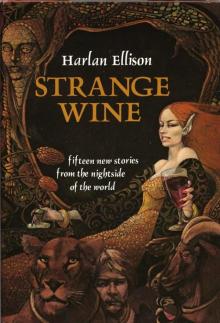 Strange Wine
Strange Wine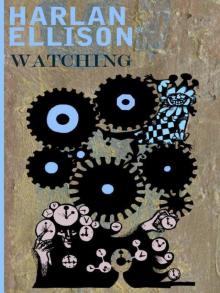 Harlan Ellison's Watching
Harlan Ellison's Watching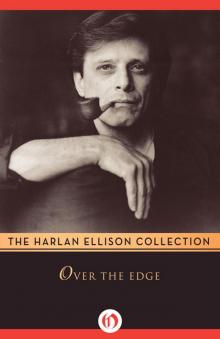 Over the Edge/An Edge in My Voice
Over the Edge/An Edge in My Voice Troublemakers: Stories by Harlan Ellison
Troublemakers: Stories by Harlan Ellison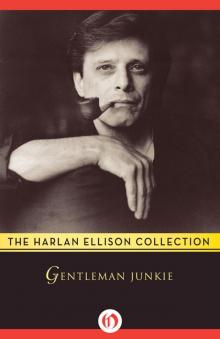 Gentleman Junkie and Other Stories of the Hung-Up Generation
Gentleman Junkie and Other Stories of the Hung-Up Generation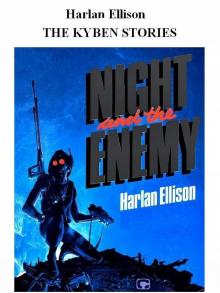 The Kyben Stories
The Kyben Stories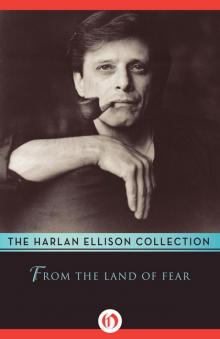 From the Land of Fear
From the Land of Fear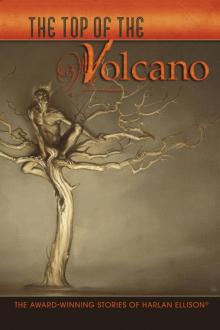 The Top of the Volcano: The Award-Winning Stories of Harlan Ellison
The Top of the Volcano: The Award-Winning Stories of Harlan Ellison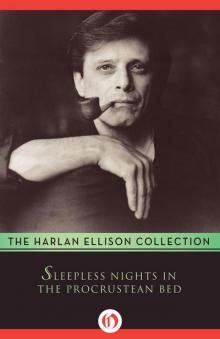 Sleepless Nights in the Procrustean Bed
Sleepless Nights in the Procrustean Bed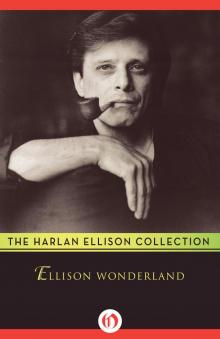 Ellison Wonderland
Ellison Wonderland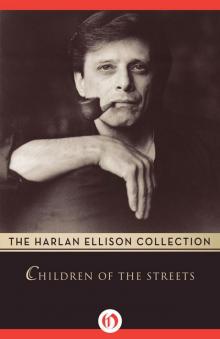 Children of the Streets
Children of the Streets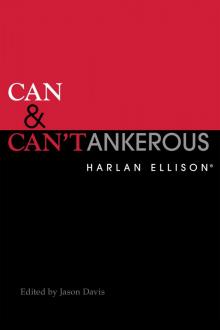 Can & Can'tankerous
Can & Can'tankerous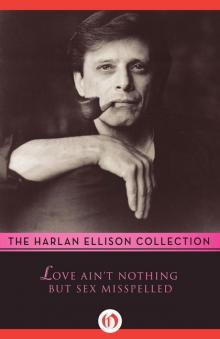 Love Ain't Nothing but Sex Misspelled
Love Ain't Nothing but Sex Misspelled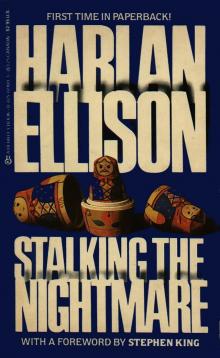 Stalking the Nightmare
Stalking the Nightmare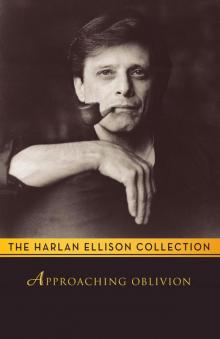 Approaching Oblivion
Approaching Oblivion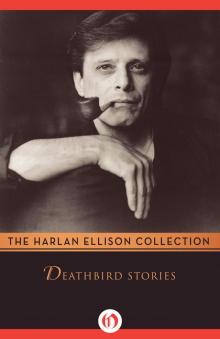 Deathbird Stories
Deathbird Stories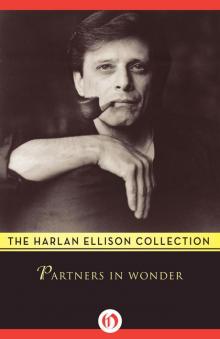 Partners in Wonder
Partners in Wonder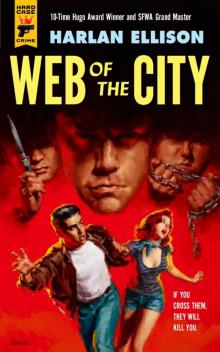 Web of the City
Web of the City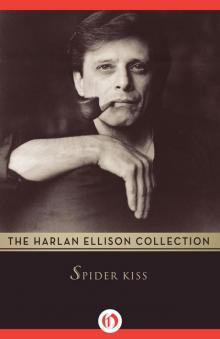 Spider Kiss
Spider Kiss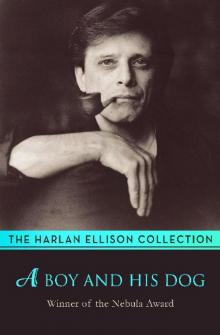 A Boy and His Dog
A Boy and His Dog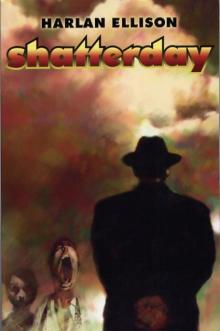 Shatterday
Shatterday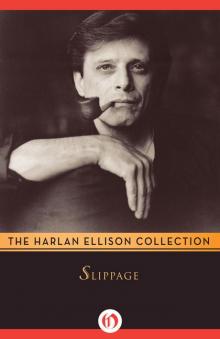 Slippage: Previously Uncollected, Precariously Poised Stories
Slippage: Previously Uncollected, Precariously Poised Stories Repent, Harlequin! Said the Ticktockman
Repent, Harlequin! Said the Ticktockman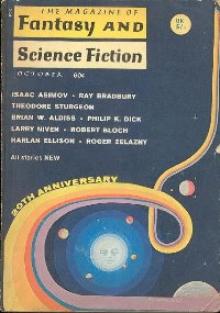 Come to Me Not in Winter's White
Come to Me Not in Winter's White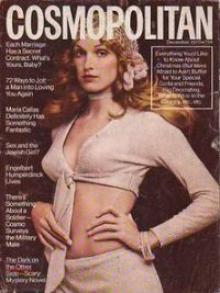 The Song the Zombie Sang
The Song the Zombie Sang The Other Glass Teat
The Other Glass Teat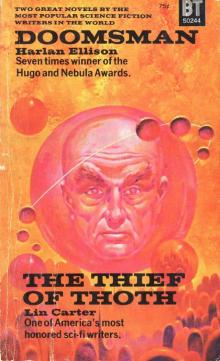 Doomsman - the Theif of Thoth
Doomsman - the Theif of Thoth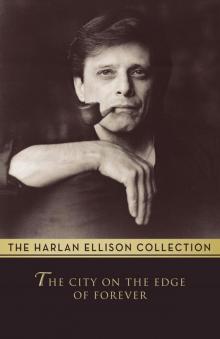 The City on the Edge of Forever
The City on the Edge of Forever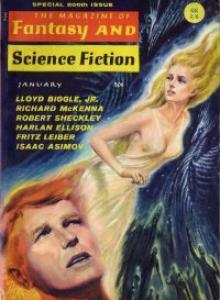 I See a Man Sitting on a Chair, and the Chair Is Biting His Leg
I See a Man Sitting on a Chair, and the Chair Is Biting His Leg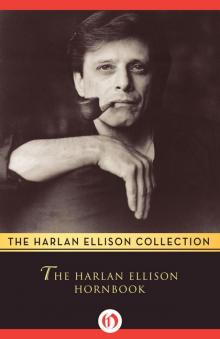 The Harlan Ellison Hornbook
The Harlan Ellison Hornbook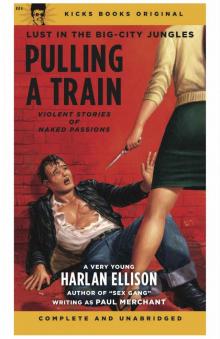 Pulling A Train
Pulling A Train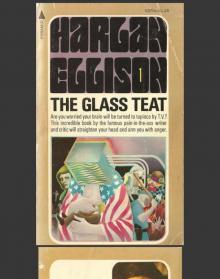 The Glass Teat - essays of opinion on the subject of television
The Glass Teat - essays of opinion on the subject of television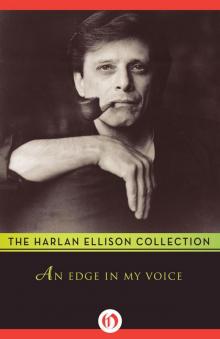 An Edge in My Voice
An Edge in My Voice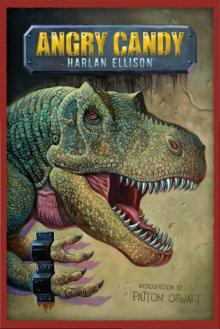 Angry Candy
Angry Candy Troublemakers
Troublemakers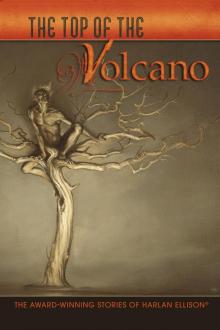 The Top of the Volcano
The Top of the Volcano Over the Edge
Over the Edge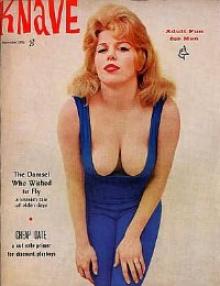 Survivor #1
Survivor #1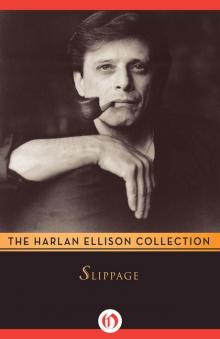 Slippage
Slippage